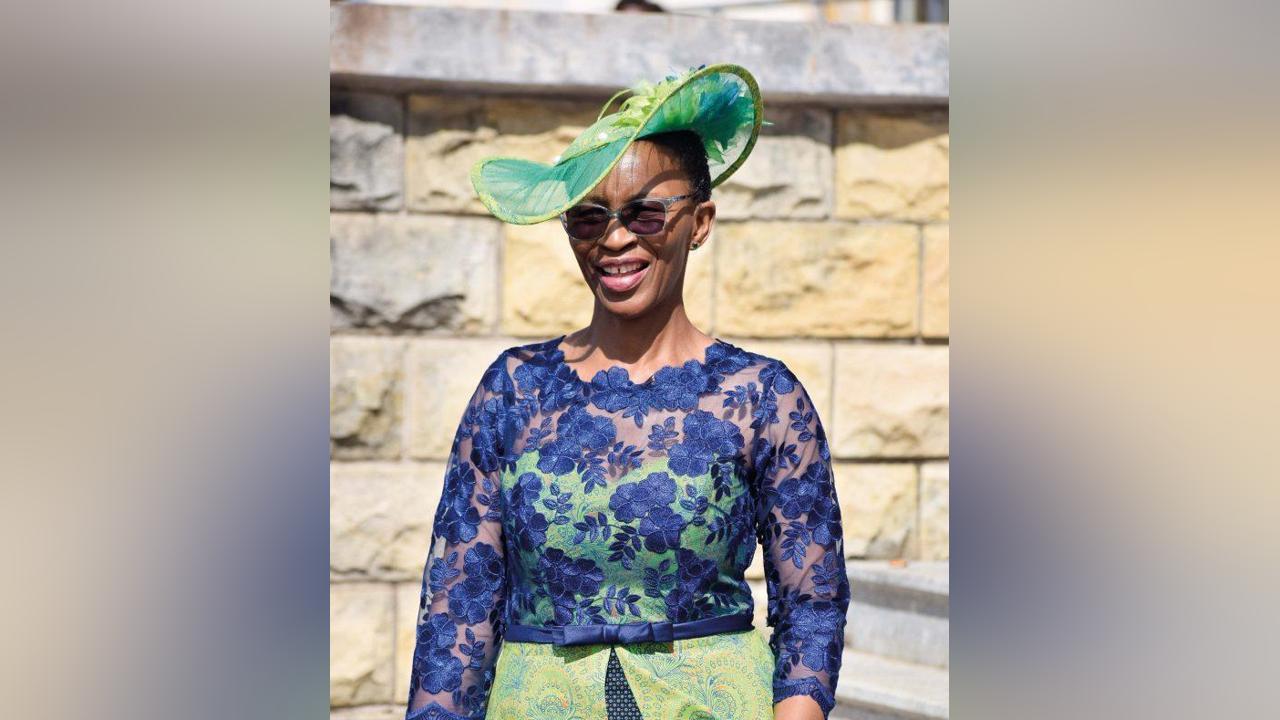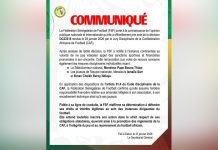Africa-Press – Lesotho. In 2015 Mahali Phamotse lost the Democratic Congress (DC)’s primary election for Matlakeng to seasoned politician Mothobi Nkhahle. Phamotse rejected the result and accused Nkhahle of rigging.
Her supporters thronged the DC offices in Maseru in a protest to demand a re-run. The party obliged but an incident that night would change Phamotse’s political career forever.
Nkhahle was viciously assaulted and left for dead in a village in Matlakeng. Although he would defeat Phamotse with one vote in the re-run, Nkhahle could not recover quick enough for the general election campaign.
The DC asked Phamotse to replace him as the Matlakeng candidate. Phamotse lost to an All Basotho Convention (ABC) candidate but made it to parliament through proportional representation and became the Minister of Education and Training.
She was thrilled but would have preferred a less controversial route to both parliament and cabinet. The rumour that she had organised the attack on Nkhahle persisted despite the lack of evidence and her strenuous denial.
Not that her protest of innocence and the absence of evidence would have changed the storyline her enemies were aggressively flogging as her political career shimmered.
Phamotse was battling a vile political system that thrives on character assassination and conspiracy theories. The coincidental chain of events made for a perfect template for a plausible conspiracy in which Phamotse had the motive to organise a hit on Nkhahle.
She had lost a primary and rejected the result. Nkhahle had been attacked on the same day Phamotse and another candidate had staged a protest that forced the party to order a fresh election.
Phamotse’s political career appeared to have taken off because of the health complications Nkhahle suffered after the beating which forced him to pull out of the race.
She replaced him as the DC candidate, made it to parliament and became a minister. Her enemies and rumour-mongers had therefore seized on what looked, sounded and smelt like a perfect crime.
“I had absolutely nothing to do with that man’s attack but it remains a stain on my reputation as a politician,” she says.
That reputation depends on who you talk to. Some describe her as a rabble-rouser always spoiling for trouble. Others say she is an irrepressibly independent woman who will not walk away from a brawl.
The bellicose reserve some of the most foul-tasting adjectives for her. The annoyed refer to her as “that woman”. Phamotse says she has become accustomed to being blamed for things she neither instigated nor did.
At times she is singled out for doing exactly what other politicians have done. For instance, she was not the first politician to challenge the Revolution for Prosperity (RFP)’s decision to block some politicians who won primaries from representing the party in the 2022 election.
She says she had initially accepted the party’s decision but had a change of heart after some candidates in a similar situation won their court case. Although 20 candidates eventually won their court case against the RFP, Phamotse has emerged as the poster girl of that rebellion against the leadership.
The narrative is that she is still leading the group of rebellious MPs who still pose an existential threat to Sam Matekane’s government. Her victory celebration in Matlakeng was viewed through the same lenses by those who accused her of inviting opposition leaders as part of the plot to topple the government.
Never mind that she was not the first RFP MP to invite opposition leaders to her celebration. “I am just an easy target for people who see shadows everywhere,” she says.
With time, Phamotse has learned to accept that this is a dubious reputation she cannot change. She doesn’t have to embrace it but just acknowledge that this is what some people think of her.
“It is what it is. It’s the nature of our politics. I just have to continue being true to my values. ” Born in Ha Shepheseli in 1969, Phamotse’s childhood was one long struggle with abject poverty and witnessed political brutality at its worst.
She had barely uttered her first words when her mother took her and two siblings to live with their maternal grandmother in Mokhotlong. She says life with her mother was bliss but they would occasionally “see people coming into the house with ghastly injuries”.
Those were the dark days of Lesotho’s politics when Leabua Jonathan’s government had unleashed a reign of terror against the Basutoland Congress Party (BCP) politicians and all those suspected of supporting them.
Most of those who ended up being nursed in her village or in her grandmother’s house were members of the Lesotho Liberation Army (LLA), a ragtag militia of the BCP, injured in skirmishes with Jonathan’s ruthless army.
Phamotse and her siblings would sometimes visit their mother who was now working at Sani Hotel where their maternal grandfather was a manager. There, they lived through a different kind of political violence.
South Africa’s apartheid government, which was at its most vicious, was pursuing ANC freedom fighters who fled to Lesotho. Sounds of gunshots would ring in the night.
And the next morning they would hear adults whisper about the “freedom fighters” caught, injured or killed. Sometimes South African soldiers would ransack the hotel looking for “freedom fighters”.
As the war escalated, Phamotse knew the drill by heart. Don’t take off your clothes and shoes when you sleep. When trouble starts, wake your brother and sister, and head for the mountains.
“We would hide in the cold mountains for hours as soldiers searched for freedom fighters. We could hear gunshots and screams of pain. ” Their grandmother died when Phamotse was about six and they had to move back to Leribe to live with their uncle.
Phamotse and her siblings were moving from a life of decent meals and scrumptious hotel food to join a wretchedly poor family of eight other children.
Their father, who held a diploma in agriculture, was now working in the mines in South Africa after being fired from the government for being a BCP supporter.
Years earlier, their father’s diploma was destroyed when his house was torched by Lebotho La Khotso, a pitiless BNP paramilitary gang that terrorised villages across the country.
With their mother still in Sani Pass, Phamotse became a ‘mother’ to her brother and sister. “We were the youngest in that family (uncle’s) and I had to take care of my siblings because no one cared.
I was a child taking care of children. ” Phamotse had to bathe her siblings and wash their clothes. Food was a daily struggle. “I had to make sure my brother and sister were there when food was served because if they missed that chance they would starve.
There was no plate for small children in that house. ” Sometimes there was nothing to eat for days and they had to rely on what they got from the school feeding scheme.
Meanwhile, Lebotho La Khotso was upending their already miserable lives. The militia would raid their home looking for her uncle who was a staunch BCP member.
She recalls how he would disappear from home for days as the militia pursued him. Phamotse experienced this politics of vengeance and violence in three ways.
The first was the general havoc unleashed on her family and the village by the militia. Her uncle was a marked man and her family suffered for it. The second was in the form of something that children of her age never experienced.
The seeds of what she endured in Leribe were unwittingly sown in Mokhotlong when her grandmother asked a friend, who was a Grade One teacher, to “babysit” Phamotse while she worked her fields.
Phamotse would sit in the friend’s class with children three years older than her. Soon she was learning to read and write even though she was supposed to be in crèche.
By the time they moved back to Leribe, she could read Sesotho fluently. She was a godsend for her uncle who was an avid consumer of political news but could not read.
His newspaper of choice was the now-defunct Leselinyana La Lesotho, published by the Lesotho Evangelical Church whose sympathies lay with the BCP. The newspaper carried grisly stories about the BNP government’s violence against political opponents.
Phamotse became her uncle’s reader. She recalls how her uncle would summon her to a windowless roundvel in the homestead, seat her under a table and read him every story in the newspaper.
From under the table, little Phamotse would broadcast nerve-wracking articles that sometimes gave her nightmares. There were stories about people killed or buried alive.
Children shot in their mothers’ back. People bombed, electrocuted or amputated. Villages burnt to ashes. Sometimes her uncle would ask her to pause a little bit so he could narrate how he knew some of the victims.
Some of the victims were his friends or party comrades. At times her voice would be punctuated with sounds of gunshots. There were also days when her reading would be abruptly stopped when soldiers or the Lebotho La Khotso militia kicked the door.
“My uncle would always escape and I would be left under the table reading the news.
The militia members would pull me from under the table and burn the newspaper. ” Then there were her father’s tribulations at the hands of Jonathan’s regime.
She says her father paid dearly for his striking resemblance to Ntsu Mokhehle, the BCP leader that Jonathan wanted to eliminate because of his politics.
On several occasions, her father was mistaken for Mokhehle and arrested at the border as he came back from the mines in South Africa. He would be detained for days until the government was sure they had the wrong person.
“But they would beat and take every penny from him. He would arrive home dirty and bruised. ” Phamotse believes that trauma, repeated several times, pushed her father to the bottle.
Her mother moved back to Leribe when she was about to start high school but their misery continued. Their father was still drinking heavily and being harassed for “being Mokhehle”.
Money was tight and meals were intermittent morsels. Phamotse dropped out of school in Form C when her father died. She started looking for a job. The plan, she says, was that the family would use the little they had to send her sister and brother to school.
“I was ready to work and contribute something to the family.
” Her return to school was a result of a stroke of luck. Her headmaster saw her lining up for a job and asked why she was not at school.
She told her story and the headmaster ordered her to come to school the next day. Phamotse went through high school without being asked for fees. Only when she went to pick her final Form E results did she discover why.
A Ugandan expatriate teacher, Manuel Raposo, had quietly paid her fees. “After hearing that I broke down and cried. Raposo was the teacher I disliked (most) because he was always strict with me.
I was a very naughty student. ” It would be several years before she could track down Raposo to give her “gratitude and apologise”. They have been communicating since then.
Her decision on what to study at the National University of Lesotho (NUL) was not based on ambition but pragmatism. She desperately wanted to read law but knew it would be difficult to get a job.
“I opted for education because there was a serious shortage of teachers at that time.
” After graduation, she taught at a high school in Butha-Buthe for six years before leaving for Wits University to earn her Honours, Masters and PhD.
After a brief stint at the National Health Technical College she joined the NUL where she taught education and ethics for more than a decade. Phamotse says she avoided active politics “because I hated what it had done to my father, family and life”.
Yet no matter how much she tried to stay away from it, politics would always find her. If not directly then through her former students who would always tell her how they are struggling to get jobs.
“I would meet them years after graduation and they would be disillusioned.
“I began to think there was a way for me to make a difference. I thought I could make a difference. ”
She agonised about joining politics until 2014 when she took the plunge. Taking on Nkhahle was as ambitious as it was risky. She was a novice going against an incumbent who is a veteran politician.
The people of Matlakeng knew her as a university lecturer, not a politician. Some openly told her they would not vote for a “young girl”. It wasn’t long before she learned that politics is a game played by those willing to use crude means to get their way.
She says Nkhahle rigged the primary election in a “brazen way”. She lost the rerun ordered by the party but ended up being the candidate when Nkhahle had to pull out due to ill-health caused by the brutal assault he suffered just as Phamotse was protesting his initial victory.
That was eight years ago but some people still believe Phamotse instigated Nkhahle’s attack. Phamotse says she is not surprised because “it is simply the result of the politics of lies that is so pervasive in our country”.
“We have a nasty brand of politics in which people thrive on malicious lies instead of ideas.
” She says she experienced it when she followed Monyane Moleleki after he left the DC to form the Alliance of Democrats (AD).
Back then, she was described as an ungrateful politician who had betrayed Pakalitha Mosilili, the man who had made her political career. She endured it again early last year when she resigned as the AD’s secretary general to join Matekane’s RFP.
An angry Moleleki insinuated that she was a “sellout” conniving with enemies to destroy the AD. Phamotse says she initially ignored her cold welcome from some in the RFP because she thought this was a chance to do politics differently.
She was also ready to accept the use of meritocracy to select candidates. “I wanted to give this a chance until I found the real reason. Along the way, I discovered this had nothing to do with meritocracy but a sinister agenda of some people to block their perceived enemies.
“The meritocracy came up as an afterthought because they wanted to exclude other people like me. It was not a principle but a plan based on a hidden agenda and I could not stand for that. ”
What irked her was that the leadership was “violating the will of the people and defeating democratic principles that were supposed to be the foundation of a political movement that was supposed to do things differently.
” She still has faith in Matekane but fears things are beginning to go astray.
Her concern, which she insists is not an attack on anyone in particular, is that “some people are carving out centres of power that have nothing to do with achieving the party’s goal”.
“Everyone wants the leader’s attention. The real focus is being lost because there is no principle to guide the policy.
It looks like we are learning as we go but I think we need to go back to the drawing board. ” Those words are likely to get her in trouble with some in the party but this is Phamotse and she will speak her mind.
For More News And Analysis About Lesotho Follow Africa-Press






